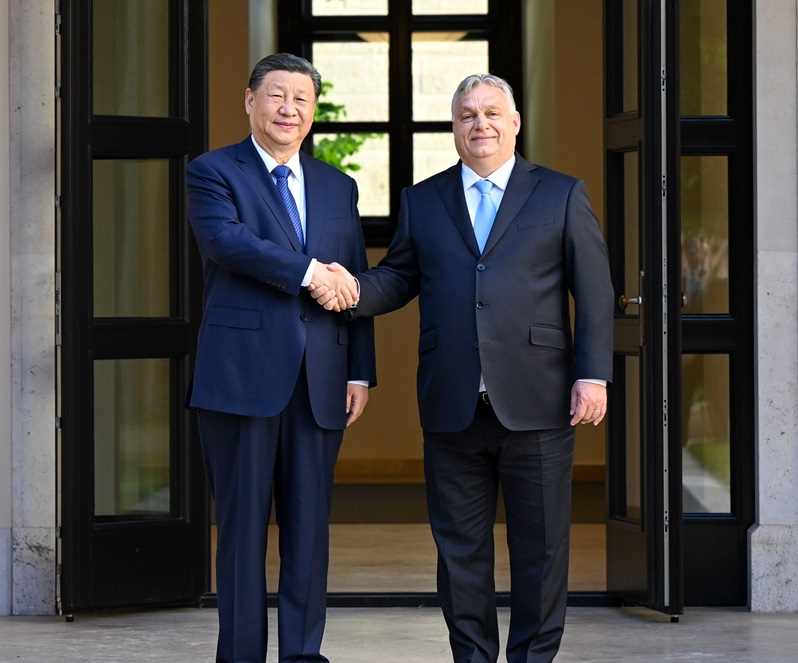Orban chooses Chinese nuclear power in 'new era partnership'
Among the 18 agreements signed in Budapest with Xi Jinping there is also cooperation on nuclear power plants. In the background are the difficulties of the new Paks II plant project, under construction with the Russian agency Rosatom and at risk of sanctions. For his part, the Chinese president praises Hungarian support for Beijing on "Taiwan, Hong Kong and human rights".
Milan (AsiaNews/Agencies) - Hungary is open to cooperation with China also on nuclear energy. In fact, only one of the 18 agreements signed yesterday as part of Xi Jinping's visit to Budapest, the last stage of his trip to Europe which this week also took him to France and Serbia, is dedicated to atomic cooperation.
In Prime Minister Viktor Orban's Hungary, the Chinese president has further relaunched the axis with the first European partner of the Belt and Road Initiative, coining the definition of "global strategic partnership for all seasons in the new era" for relations with Budapest.
Beyond the steps forward on issues such as the Budapest-Belgrade railway route - and the "colorful" aspects such as the broadcast on Hungarian TV of the cult program of the Beijing state TV "The classics cited by Xi Jinping" - it is precisely the signing of the civil nuclear agreement clearly reveals the geopolitical framework of this partnership.
Hungary currently has only one nuclear power plant, the Paks plant, started in 1974 and dating back to the Soviet era.
An old plant whose activity was extended in 2017 for another twenty years, awaiting a new plant - called Paks II - which Budapest is still building with Rosatom, the Russian atomic energy agency.
However, the framework of European sanctions against Moscow for the war in Ukraine is putting the project in difficulty: civil nuclear energy itself is not among the areas subject to an embargo, but the problems arise on individual components which can have both military and civil use .
Just two days ago - just on the eve of Xi Jinping's arrival in Budapest - the Hungarian investigative journalism site Direkt36 published an investigation according to which in recent months Prime Minister Orban himself would have blocked a "plan B" developed by Ministry of Energy and which hypothesized to overcome the impasse by starting the construction of a third nuclear plant in the country in collaboration with the French Framatome, effectively dumping the Paks II project underway with the Russians.
In light of this affair, it is therefore easy to hypothesize that the memorandum of cooperation on atomic energy signed with Beijing instead aims to put the plan for the second power plant back on track, making use of the collaboration of the China Atomic Energy Authority (increasingly involved also in export of its nuclear know-how) for these aspects which would risk falling under sanctions.
China obviously aims to give political weight to these economic agreements in a country that will assume leadership of the European Union in the next six months.
In his speech in Budapest, President Xi Jinping did not fail to declare that Beijing "appreciates Hungary's long-term and determined pursuit of friendly policies towards China" underlining expressly "the clear and firm support for China on issues relating to Taiwan, Hong Kong and human rights".
Adding - with a clear reference to the tensions between Budapest and Brussels - that for its part, China "firmly supports Hungary in pursuing a development path suited to its national conditions". While Orban responded by praising Beijing's "peace initiatives" while Hungary finds itself alone in "a Europe that is on the side of war".
The quote on Hong Kong - in particular - was greeted with bitterness by Luke de Pulford, British human rights activist, founder and executive director of the Inter-Parliamentary Alliance on China.
In a post on X he commented: “In August 2019 I was at an event in Portugal, Orban was also there. I remember that he congratulated the father of democracy in Hong Kong, Martin Lee (now on trial under the National Security Law wanted by Beijing, ed.), and the heroic Cardinal Zen for their courage in the face of oppression by the Party Chinese Communist. Look at it now."







.png)










